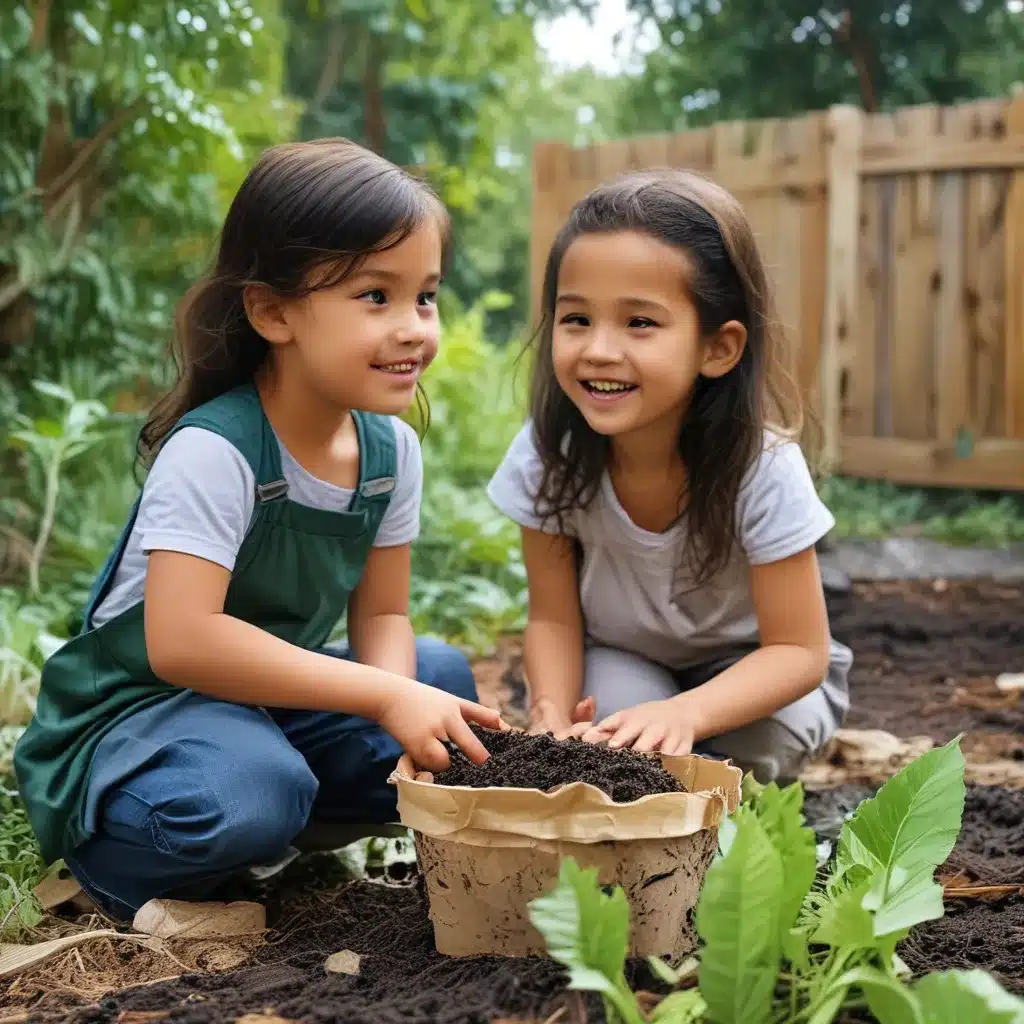
Composting: Unlocking Nature’s Secret Superpowers
Have you ever strolled through a lush, verdant forest and marveled at the incredible diversity of life thriving there? From the towering trees to the scurrying squirrels, it’s a vibrant ecosystem that seems to renew itself effortlessly. Well, the secret to this natural rejuvenation lies beneath our feet – in the magical process of decomposition.
Composting, the art of transforming food scraps and other organic matter into nutrient-rich soil, is a true superpower of nature. It’s a cycle as old as the Earth itself, where the dead nourish the living, and the living in turn become the food for future generations. And as parents, we have the incredible opportunity to harness this power and share it with our kids, cultivating a deeper connection to the natural world and a more sustainable future.
The Compost Conundrum: Turning Trash into Treasure
Picture this: your family has just finished a hearty meal, plates licked clean. But what happens to those leftover scraps – the carrot peels, the eggshells, the crusts of bread? For most of us, it’s a familiar routine: scrape them into the trash, tie up the bag, and out to the curb they go.
But what if I told you there’s a better way? That those food scraps, rather than ending up in a landfill, could be transformed into rich, life-giving soil to nourish your garden and inspire your children’s imaginations? This is the magic of composting, a process that takes what we often view as waste and turns it into a valuable resource.
As author Becca Tarnas writes, “No one would sleep that night of course. The world would create new religions overnight. We would be ecstatic, delirious, made rapturous by the glory of God.” While Tarnas is referring to the awe-inspiring sight of the stars, I can’t help but feel the same sense of wonder and reverence when I think about the transformative power of compost.
Composting 101: A Hands-On Lesson for Kids
Getting started with composting doesn’t have to be complicated. In fact, it’s a great way to get your kids involved and teach them about the incredible cycle of life. Here are a few simple steps to get your family started:
-
Gather Your Supplies: You’ll need a compost bin or a designated area in your yard, a balance of “green” (nitrogen-rich) and “brown” (carbon-rich) materials, and a bit of patience.
-
Educate and Engage: Involve your kids in the process from the beginning. Explain what composting is, why it’s important, and let them help you collect and sort the materials.
-
Build Your Compost Pile: Layer your green and brown materials, making sure to keep the pile moist but not soaked. Turn the pile regularly to aerate it and speed up the decomposition.
-
Monitor and Maintain: Your compost pile will need a little TLC – occasionally add water, turn the pile, and keep an eye out for any issues.
-
Harvest the Bounty: After several months, your compost will have transformed into a rich, dark soil-like substance. Use this “black gold” to nourish your garden, potted plants, or even start a small vegetable patch with your kids.
The hands-on experience of composting can be a truly magical learning opportunity for children. They’ll witness firsthand how nature’s cycles work, how food waste can be repurposed, and how their own actions can have a positive impact on the environment.
Composting and Kids: A Recipe for Sustainability
But the benefits of composting with your kids go far beyond just the practical aspects. Thornapple Community Supported Agriculture (CSA) has seen firsthand how this simple act can inspire a deeper connection to the natural world and a more sustainable mindset in young minds.
When children are involved in the composting process, they develop a sense of responsibility and ownership over the health of their local ecosystem. They see how their food scraps are transformed into nutrient-rich soil, which in turn nourishes the plants that provide their next meal. This circular, regenerative thinking is the foundation of a sustainable future.
Moreover, composting taps into a child’s innate curiosity and sense of wonder. Watching the decomposition process unfold, observing the tiny creatures that call the compost pile home, and witnessing the creation of new life from what was once “waste” – these are the moments that ignite a lifelong passion for the natural world.
Composting for a Cause: Empowering Kids to Make a Difference
But the benefits of composting with kids don’t stop there. This hands-on activity can also inspire a deeper sense of empowerment and civic engagement. By teaching children about the impact of food waste on the environment, we empower them to become agents of change.
Imagine your child, armed with the knowledge and experience of composting, sharing their newfound wisdom with friends, family, and their local community. They might start a composting initiative at their school, organize a neighborhood compost collection, or even lobby local authorities to improve waste management systems. The ripple effects of a child’s passion for composting can be far-reaching and profound.
Cultivating a Compost-Powered Future
As parents, we have an incredible opportunity to nurture the next generation of environmental stewards. By inviting our kids into the world of composting, we’re not just teaching them a practical skill – we’re inspiring them to see the interconnectedness of all living things, to appreciate the cyclical nature of our planet, and to believe in their power to make a difference.
So, the next time you’re scraping those food scraps into the trash, I encourage you to pause and consider the compost-powered future that awaits. With a little bit of effort and a lot of imagination, we can transform our waste into wonders, our children into champions, and our world into a more sustainable, nourishing place for all.



